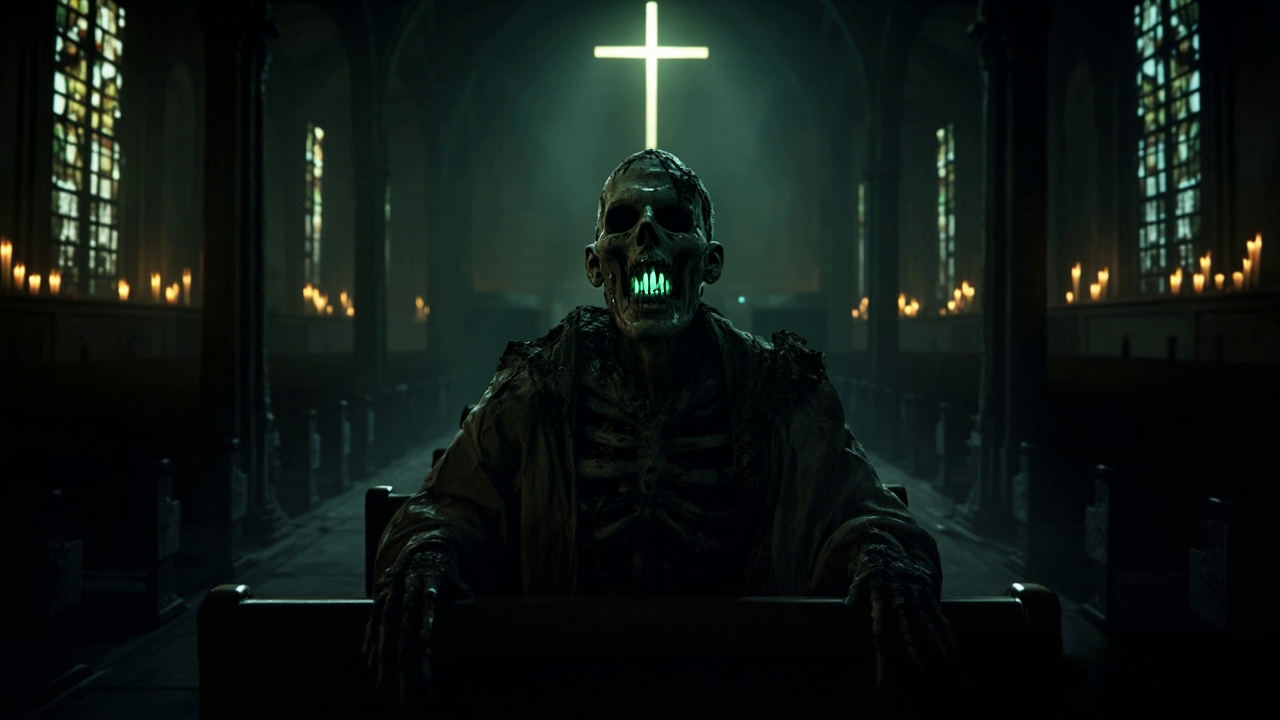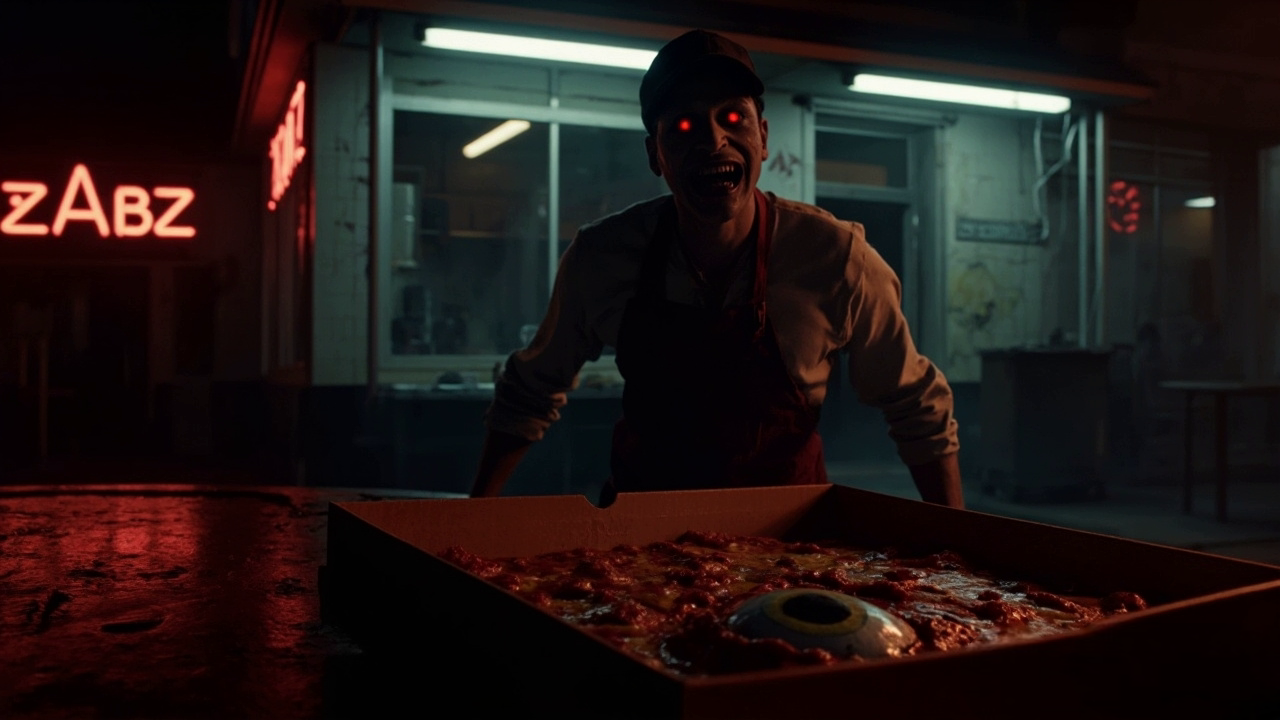
In the corner of a dim curio shop sat a male doll named Abel—an antique marionette with lifelike glass eyes, a pale wooden face, and finely tailored, timeworn clothing. His short, neatly combed hair and solemn expression gave him an air of tragic dignity. He was no ordinary toy, though. He had a presence. A promise edged in stillness.
Mark Everly was a man of peculiar tastes: rare books, empty theaters, and dolls. He collected them with purpose, seeking emotional resonance in their lifeless forms. So when he discovered Abel in a forgotten shop on a rainy November afternoon, he felt compelled. The marionette seemed to watch him, though he first dismissed it as an illusion of the glass eyes in store light.
The shopkeeper—a slender man with peeling skin and dull, grey eyes—handed Mark the doll without a word. The price was a simple whispered number. Mark paid, wrapped, and carried Abel home, oddly cautious, though he told himself it was nothing more than superstition.
Mark placed Abel on a polished oak shelf in his study, surrounded by dusty volumes and curiosities. That night, the house was silent except for the ticking clock. During a midnight stir, Mark swore he heard soft tapping—wood against wood. In the dim moonlight he saw Abel’s right arm slightly lifted.
He blinked. The arm dropped. A half-second later, he felt watched. He dismissed the nervous thought, reminding himself that a collector should not be afraid of his possessions. But sleep came uneasy.
Over the next week, Mark observed small changes. Abel’s painted finger at times pointed, as if directing attention. His glass eyes seemed dull one moment, unnaturally bright the next. Mark chalked it up to lighting or his own imagination. Still, each evening he avoided the shelf, retreated to other rooms, preferring the company of books to the unsettling stillness of the doll.
One morning, walking into the study, Mark found a message carved into the desk’s wood: “HELLO.”
He froze, heart racing. There was no knife or tool nearby. No explanation. Sweat clung to his neck. Across the desk, Abel sat expressionless, his wooden fingers folded as though waiting. Mark reached for the nearest book, covering the message. His pulse pounded. Rationality failed.
He left the study in a hurry. The message was gone the next day when he returned, smooth grain appearing as if before the carving. But it had been there. He knew it.
At night, Mark began hearing whispering—soft, too gentle to catch words, like soft rehearsal. Often it sounded male, deep and broken. Without turning on lights, he’d follow the sound to the shelf. It came precisely from Abel’s location. The whispers stopped once he stood close.
One night, he leapt when the whisper turned to a low laugh. Marks appeared on the desk—wood chips from a fresh carving. But again, the words were gone in daylight. Only the dust trace remained.
One afternoon, Mark found Abel missing. Panic roared as he searched. There, in the garage, he found the doll in a large wooden crate—shipped, or moved by unknown hands. The crate lid bore the name of Abel’s maker: “Clemens & Sons, 1892.” The date gave Mark chills.
Inside, the dust-shrouded doll lay over packing sawdust, untouched. The garage was silent, far from the curio room. Yet Mark felt Abel watching him from across the driveway. He locked doors, closed the house, and brought Abel back inside by dawn.
That night, snow began to fall. Mark spread a blanket over Abel and tried to sleep. At midnight, the blanket was off, Abel perched upright in the bed. The doll’s head tilted, glass eyes catching moonlight.
Then Mark saw a second carving on the bedside table: “COME OUT.”
The words were etched in Abel’s black-painted fingernail—not on wood. They were on Abel. Mark’s breath stuck in his throat. He stared at the doll’s lifeless gaze that now held active intent. He landed on the floor, hands shaking, unable to look away.
The next days were a blur. Mark slept little. His house was filled with pacing, lights on, whisper-checking every corner. Abel remained on the shelf, but the scent of stale sawdust clung to the air. Sometimes the doll would be standing in different places: the living room mantle, the kitchen counter, or the window sill staring at empty sidewalks. It moved while he wasn’t looking.
He began recording audio overnight. The recorder picked up his name spoken in low male tones. An unnatural slow laughter. On playback, the audio was layered: his own voice, misaligned, speaking in Abel’s voice: “I’m waiting.”
Mark contacted his friend, Sarah, an urban legend blogger. He described events. She agreed to spend the night, hoping to gather data. That evening, they set up cameras and sensors around the house and allowed only essential lights.
After midnight, cameras caught the doll walking—Abel stepping down the stairs on its own, flicking its head. Sarah, asleep in the living room, woke at the sound of double knock wood. She saw Abel standing by the window. She grabbed a camera and whispered hello. The doll turned toward her, silent. Sarah screamed.
Mark rushed in. The footage shows both of them crying, then—silence. The next morning, Sarah was gone. No trace. No note. Just an empty house and two stunned witnesses.
Mark, shattered, nearly collapsed. He blamed himself. He scoured the house in daylight, calling Sarah’s name. No answer. Abel sat in silence. Clean and calm. The window was closed. No footprints.
That night, in panic, Mark smashed the cameras, burned the recordings. He pressed Abel’s face into fireplace ashes until the wood blackened. Still, the doll remained pristine. Its glass eyes reflected the flames.
Abel spoke that night: “I’m here.”
Mark jolted upright in terror, swinging at the doll. The wooden swat felt solid. The doll didn’t fall. Instead, lights flickered and extinguished. The doll remained glowing in the moonlight.
Desperate, Mark researched Abel’s origin. He discovered a file: the Clemens brothers were twin artisans who crafted marionettes rumored to contain fractured spirits. Each doll given a name and purpose—companions in loneliness. But one doll, known simply as “Brother,” had been assembled from a dying child’s ashes mixed with wood. A tragic soul unable to rest. Its glass eye captured what’s left of its soul.
Mark realized Abel wasn’t just male—it was Brother: the broken child who called his soul into wood.
He prepared a confrontation. In the study, under scorching lamps, Mark arranged Abel in candlelight with a ritual he’d found in the Clemens archive: an exorcism-like prompt. He sprinkled salt, arranged a circle of photographs of Sarah, diapers, words of calm. He crossed his fingers, intending to confront Brother head-on.
That night, he began reciting the words. The candles guttered. Abel’s face changed—wood grain appearing human. Eyes widened impossibly.
Then everything broke loose: the windows rattled, yelling burst from the walls, and the doll’s head snapped upward. The room spun. A small shriek, like a child’s pain, echoed. Mark realized he was powerless.
In desperation, Mark grabbed the doll and ran outside into the swirling snow. The wind howled; the doll’s clothes snapped like leather. He held Abel tightly, heart pounding. He ran until he reached the frozen pond near the house. Breathing staccato, he hurled Abel onto the ice.
Crack. The doll’s wood-shod feet hit ice and slid. He looked back. The marionette stood upright, spinning to face him.
He sprinted away, returning with a crowbar. He cracked the doll’s arm. Red resin oozed like blood. The doll gasped—only feigning. Mark smashed more. The ice groaned and opened beneath the doll.
As he retreated, the surface closed with murky water that glinted red.
He ran into woodland night, never looking back.
But he did look back. Far off, he saw a small shape walking toward the house. It paused, then limped forward—glass eye catching moonlight.
The wind carried a whisper across the dark grass: “He comes when called.”
Mark didn’t stop running, even when his lungs burned. Echoes of footsteps chased him in his memory.
Weeks later, Mark lived in a cramped apartment by the city edge. He avoided antiques, avoided dolls, avoided shadows. His friends were gone. His home was bare. Still, sometimes late at night, he heard a slow knock—wood on glass. A moving stop. A pause.
He never answered. He couldn’t.
In his dreams, he heard a child’s voice:
“Brother comes for home.”
Every time, he woke and stared at the dark corner of the ceiling—silently scanning for glassy eyes.
They say marionettes made from souls never forget. They wait for the call. Perhaps Abel — or Brother — still walks, somewhere, waiting for his next name to echo in the silence.
RELATED POSTS
View all



